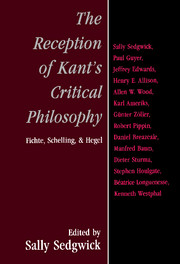Book contents
- Frontmatter
- Contents
- Notes on the Contributors
- Acknowledgments
- Introduction: Idealism from Kant to Hegel
- 1 The Unity of Nature and Freedom: Kant's Conception of the System of Philosophy
- 2 Spinozism, Freedom, and Transcendental Dynamics in Kant's Final System of Transcendental Idealism
- 3 Is the Critique of Judgment “Post-Critical”?
- 4 The “I” as Principle of Practical Philosophy
- 5 The Practical Foundation of Philosophy in Kant, Fichte, and After
- 6 From Critique to Metacritique: Fichte's Transformation of Kant's Transcendental Idealism
- 7 Fichte's Alleged Subjective, Psychological, One-Sided Idealism
- 8 The Spirit of the Wissenschaftslehre
- 9 The Beginnings of Schelling's Philosophy of Nature
- 10 The Nature of Subjectivity: The Critical and Systematic Function of Schelling's Philosophy of Nature
- 11 Substance, Causality, and the Question of Method in Hegel's Science of Logic
- 12 Point of View of Man or Knowledge of God: Kant and Hegel on Concept, Judgment, and Reason
- 13 Kant, Hegel, and the Fate of “the” Intuitive Intellect
- 14 Metaphysics and Morality in Kant and Hegel
- Bibliography
- Index
Introduction: Idealism from Kant to Hegel
Published online by Cambridge University Press: 03 December 2009
- Frontmatter
- Contents
- Notes on the Contributors
- Acknowledgments
- Introduction: Idealism from Kant to Hegel
- 1 The Unity of Nature and Freedom: Kant's Conception of the System of Philosophy
- 2 Spinozism, Freedom, and Transcendental Dynamics in Kant's Final System of Transcendental Idealism
- 3 Is the Critique of Judgment “Post-Critical”?
- 4 The “I” as Principle of Practical Philosophy
- 5 The Practical Foundation of Philosophy in Kant, Fichte, and After
- 6 From Critique to Metacritique: Fichte's Transformation of Kant's Transcendental Idealism
- 7 Fichte's Alleged Subjective, Psychological, One-Sided Idealism
- 8 The Spirit of the Wissenschaftslehre
- 9 The Beginnings of Schelling's Philosophy of Nature
- 10 The Nature of Subjectivity: The Critical and Systematic Function of Schelling's Philosophy of Nature
- 11 Substance, Causality, and the Question of Method in Hegel's Science of Logic
- 12 Point of View of Man or Knowledge of God: Kant and Hegel on Concept, Judgment, and Reason
- 13 Kant, Hegel, and the Fate of “the” Intuitive Intellect
- 14 Metaphysics and Morality in Kant and Hegel
- Bibliography
- Index
Summary
The development of German idealism after Kant is in large part a story of the various ways in which features of Kant's Critical philosophy get either preserved or transformed in the systems of Fichte, Schelling, and Hegel. While Fichte and Schelling represent their forms of idealism as basically consistent with the main principles of the Critical philosophy, Hegel tells us that an adequate form of idealism can be achieved only by parting ways with Kant in fundamental respects. An adequate form of idealism, Fichte, Schelling, and Hegel agree, is an idealism that provides a genuine alternative to subject-object dualism. It is in fact in order to challenge dualism, according to these thinkers, that philosophy comes into existence at all. The central task of philosophy or of idealism in particular is to achieve harmony or reconciliation, to replace dichotomy with “identity.” To varying degrees, each of these later idealists believes that, although Kant's philosophy invites the charge of dualism, it also contains resources for overcoming it.
With one exception, the authors contributing to this collection have written their papers with the intention of illuminating the reception and interpretation of Kant's Critical philosophy by Fichte, Schelling, and Hegel. They represent a wide range of views in their estimation of the claim of the later idealists to have developed or completed a philosophical program already defended by Kant. They also represent a diversity of opinion with regard to the question whether the transformation of idealism from Kant to Hegel counts as an instance of philosophical progress.
- Type
- Chapter
- Information
- The Reception of Kant's Critical PhilosophyFichte, Schelling, and Hegel, pp. 1 - 18Publisher: Cambridge University PressPrint publication year: 2000
- 1
- Cited by



